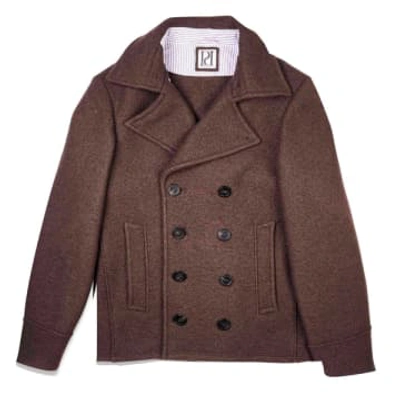- ModeSens /
- Men /
- Puristic Project /
- Clothing /
- Trenchcoats
### M02 Wool Peacoat. The only peacoat you will need.* 100% milled wool* Watterproof* Windproof* 100% cotton lining* Straight cut* Made in Germany### Milled Wool called "WALKSTOFF", a fabric with a long tradition and a great future **The history** The method of felting woollen fabrics has been known for a long time in many parts of the world. The oldest finds date back to around 6500 BC and were discovered in what is now Turkey. In the Altai Mountains in Siberia, garments made of whalecloth were found in graves dating back to the 7th century BC. Preserved by the "eternal ice" in this region, the clothes could not only keep their bright colours, but also their good condition. In the Alps, the method of wool felting has been known for more than 2000 years. People used the wool of sheep, goats and wild animals as raw material for making socks, capes and other garments. Warriors even covered their shields with this felt. Around 1350, knitted wool was used for the first time as the basis for whalecloth. Today, these very traditional woollen jackets are still very popular in all alpine regions of Europe. The production of fulling cloth has a very long tradition throughout history. In 1952, the Gottstein company started the industrial production of fulling cloth. **The method** The English translation of the German word 'Walkstoff' is a perfect description of the process: boiled wool. Wool felts when it is exposed to temperatures above 35° C and is pushed and pulled. The structure changes and becomes thicker. The raw material shrinks by 20 - 60 % depending on the intensity of processing. Air is trapped between the individual fibres. After the fulling process, the fabric is 8 - 20 times more resistant than the knitted starting material. **The raw material** Gottstein whale fabrics perfectly complement natural materials with the latest computer-controlled production technology. The raw materials are pure new wool and clear spring water from the mountains. The raw material is only treated mechanically with the addition of heat, without the addition of softeners or other chemicals. With the aid of the latest technology, energy and water consumption can be reduced by up to 60%. The virgin wool comes from farmed Merino sheep. The raw material is subject to strict selection procedures and is carefully washed. After drying, the fibre bundles are combed and supple, which is the characteristic attribute that gives it its exceptional density and soft surface. **The arguments** Due to the natural crimping of the wool, it cannot stick together. Air pockets provide a high level of protection against the cold. Wool is extremely absorbent and can absorb up to a third of its own weight in moisture without feeling wet. Wool fabrics are very durable and biodegradable. Wool fabrics are more or less wrinkle-free. In contrast to synthetic fabrics, fuller's wool fabrics do not become electrically or magnetically charged. Wool fabrics are dirt-repellent, but can be washed at 30°.

